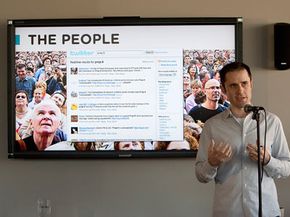You're sitting at your cubicle and you need to take a break from the spreadsheet you've been staring at for the past hour. So you decide to log on to Facebook for a little diversion. As you're reading the latest status update from the kid who sat next to you in math class in the fifth grade, a shadow falls across your desk. It's your boss, and he's looming over you with his eyes locked on your computer screen. Do you quickly minimize the page and sheepishly mumble "sorry"? Or, could you make a solid case to him that by viewing your Facebook page, you're actually increasing your productivity in the workplace?
Although most people think of social networking sites like Facebook, MySpace and Twitter as time-wasters, a number of studies have shown just the opposite. That's right -- using social networking Web sites may actually increase your job productivity. In fact, studies show that employees who use social networking sites are 9 percent more productive than those who don't [source: Fahmy].
Advertisement
It seems counterintuitive, right? How could sites that take you away from the task at hand make you more productive? Researchers credit social networking sites with giving workers needed brain breathers. When you take a couple of minutes to check up on the people and organizations you follow on Twitter, your mind gets a break from writing that tedious annual report. Additionally, it seems that people who are more social by nature and are connected to a variety of people through social networking sites are better people-persons in the workplace, which means they're skilled at interacting with others and solving problems. Social networking can also help companies track consumer trends and explore marketing strategies.
Even though studies say social networking may increase worker productivity, not all businesses are happy about their employees using these sites. The stigma of social networking as a time-wasting activity definitely seems to dominate most companies' perceptions. Many companies block or closely monitor social networking sites. What are the pros and cons of poking your friends on Facebook while you're on the clock? Find out on the next page.
Advertisement


